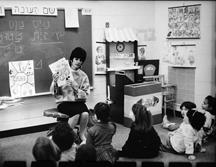
It all began with a conversation between two friends on their way to synagogue. Neil Sosland and Sidney Deutsch arrived at Congregation Ohev Sholom having decided that the time had come for a Jewish Day School in Greater Kansas City. So although multiple attempts to start a school here had failed, six sets of parents signed their names to the original Hebrew Academy charter on Jan. 21, 1966. And the rest, as they say, is history.
The school, once known simply as the Hebrew Academy and renamed in 1977 in honor of one of its biggest early supporters Hyman Brand, is celebrating its 50th anniversary throughout the year with a big celebration scheduled at the 2016 Civic Service Award gala in April.
The school has come a long way in the past 50 years.
According to an ad published Aug. 12, 1966, in The Chronicle, HBHA opened its door on Aug. 29, 1966, in the school facilities of Congregation Ohev Sholom. {mprestriction ids="1,3"}It was established for the purpose of “giving a more intensive, integrated Jewish and general education” to their children. Known then and now as a community day school, the ad stated, “The general studies of the Academy fulfill the highest standards required by the public school system of Kansas, and the Hebraic-religious education is in the spirit of traditional Judaism.”
Originally opened to grades K-3 one grade per year was added until there was a complete elementary department. The upper school was created in 1973. Its first graduating class of nine students received their diplomas in May 1976.
Today its headmaster for the past nine years, Howard Haas, reports the Jewish day school — which started with 33 students and now has an enrollment of 232 — is considered one of the very best in the country. As he likes to tell his students, it is a shining example of the virtue of perseverance, in which a “brave cadre of parents,” could make their dream of a Jewish day school come true. The cadre he refers to are the school’s founders: Carol and Sidney Deutsch, Bea* and Milton* Firestone, Joan and Walter* March, Joan (Puritz) Greenberg* and Carl Puritz, Beryl and Richard Silberg and Blanche and Neil Sosland (* of blessed memory).
“Here is a clear example of a vision that society says is not going to work, but the reality is if you have the courage to stick with your vision, you can make it happen,” Haas said.
From its borrowed facilities at Ohev Sholom, HBHA’s facilities are now located “on the beautiful Jewish Community Campus,” and, Haas said, its students come from as far away as Lawrence, Kansas. Most importantly, the students succeed.
“Our children go to the best colleges and universities in America and kids are rabbis, kids are neurosurgeons, all because of a vision 50 years ago.”
Haas said the school is financially secure, thanks to continual fundraising efforts.
“We constantly need to raise money. We’ve got some major fundraising projects coming up this year, the dinner being one.”
Still a community day school
As with any school, HBHA has evolved and changed over the years. To maintain its success, Hass said HBHA had to continue to reflect the community. One of the ways HBHA did that is by creating a special dual-track Jewish Studies program that enables all students to engage in Jewish learning that respects how Judaism is practiced within their own homes. The newer track, called Matmidim, teaches Jewish observance according to Orthodox norms, and therefore, has attracted more members of the Orthodox community to HBHA.
“Along with that, we have more Reform students than we’ve had before, which also reflects how HBHA meets the needs of our community as it stands today,” Haas said.

One of Haas’ favorite sayings about the school is that it is “one tribe with many different facets.” Through parent surveys, HBHA has learned that the school’s diversity is one of the things that attracts families to it.
“When you walk around here, you see everyone getting along, regardless of which branch of Judaism they observe. I want all of our kids to be able to graduate and to be able to feel comfortable anywhere in the world. Our kids are prepared to do that,” Haas noted.
Along with staying a community day school, Haas sees HBHA as a broker of Jewish education in the community.
“That’s why we are sponsoring Melton. We are also working with Congregation Beth Torah helping their students with Hebrew pre Bar and Bat Mitzvah. I think we just have to continue to survey what the community wants to be able to respond,” Haas added.
From generation to generation
A big source of pride for HBHA is that currently almost a quarter of the school’s enrollment, 52 students to be exact, are children of alumni.
“I think the alumni had a positive experience here, and that’s why they are sending their children here,” Haas noted.
One of those alumni students is first-grader Liam Harris, the great-grandson of Hyman Brand. He thinks it’s cool the school is named after his great-grandfather, and he loves hearing his grandmother tell him stories about the man the school is named for.
Alum and parent Jeff Goldenberg graduated from HBHA in 1986, spending his entire school career at HBHA. His three daughters are all students at HBHA, each also beginning in kindergarten. He’s seen a lot of changes at HBHA over the years.
“There was no high school program when I attended. Luckily, a partnership with Barstow allowed me make the most of my Judaic studies and the HBHA environment without sacrificing general studies. As a bonus, I had the opportunity to take part in interscholastic sports,” Goldenberg said.
Another change Goldenberg has witnessed is in the Jewish studies program.
“Our Judaic component has made huge strides over the years. Though we had incredible teachers, it was not uncommon to have a Judaics teacher whose background was simply being a native Israeli. We were very much like a start-up through many of those first 20 years, developing programs and infrastructure as the need arose. Our planning and vision are now a critical piece to our current and continued success,” he continued.
He believes his daughters are developing as students and human beings in an environment where they are cherished.
“They are afforded every opportunity to achieve academic success. They also benefit, as I did, from the opportunities to engage in leadership, athletics, public speaking, community service, etc. That is not easily attainable in a larger school — and certainly not at the same time! Aside from the education and activities, they are learning about who they are as Jews and as individuals and embrace what they learn. What our school provides to this end is not learned in a classroom,” he continued.
Goldenberg’s oldest daughter Elana is a senior who will graduate in May 2016. She said it’s amazing that the school has been able to last this long, because a lot of Jewish schools haven’t been able to thrive for 50 years.
“The fact that my dad went here is pretty incredible,” Elana said.
“It’s also pretty great that we’ve had so many changes in the last 50 years. The curriculum and the building have changed to adapt to today’s world. Even though it’s great that HBHA has evolved with the times, it’s also a little sad because it’s not the same school. It’s still the same great values and teachers and education, but it’s a whole different atmosphere,” said Elana.
Community’s ‘jewel’ attracts others
The atmosphere that includes the joy of being Jewish and the joy of learning is just one of the things that Haas believes has enabled the school to celebrate its golden anniversary. It’s also why he believes outsiders are attracted to the Kansas City community and the school.
“I used to say that we were a jewel of the Midwest, but I think we are a jewel in Jewish education nationwide and it is all because of the vision people had 50 years ago,” Haas said.
“I think Blanche Sosland once said you can judge a school by the happiness of the children. When you walk through our halls you see we have joyous children.”
HBHA representatives — including Haas and BIAV’s Rabbi Daniel Rockoff, who also happens to run the Matmidim program — annually attend an Orthodox Union convention in New York City to attract more Jewish people to our community.
“We had two or three families move here just because of the Kansas City booth we had there. We later learned these same families would not have even stopped at the booth if we did not offer a school for their children,” Haas said.
“We are attracting Orthodox Jews from throughout the nation, mostly from New York. They are considering Kansas City as a viable option because there is a day school,” he continued. “It’s extraordinarily important to many people.”
He said parents are sending their children to the day school for a variety of reasons.
“We’re finding it is a combination of an intellectual atmosphere and the religious atmosphere and when people walk in here they feel as though they have come home,” Haas said. “It’s one place in the city where even parents can feel very much a part of the community. They know besides our strong academics, HBHA offers a very warm, nurturing environment. That’s why people come and that’s why people stay.”
Looking ahead to the future
Haas said the school is “going to go for at least 50 more years.”
He attributes its current success to “this incredible community.”
“I think the school is a reflection of the community and we meet the needs of children and their parents. Whenever we recruit people we say to the parents, ‘You also have to be a part of the school.’ ”
In addition to the “incredible support from parents,” Haas said credit for HBHA’s success should also go to its board, which is “extraordinarily supportive.”
Then there are the teachers and staff.
“I’ve been in education a long time now. I’ve never worked with a better staff in my entire life — from administration to support staff to teachers. And when you walk in here you can feel it. There’s joy in what they are doing. That’s what makes us successful.”
“We are very serious about what we do but we believe in doing it in a very joyful way.”{/mprestriction}



